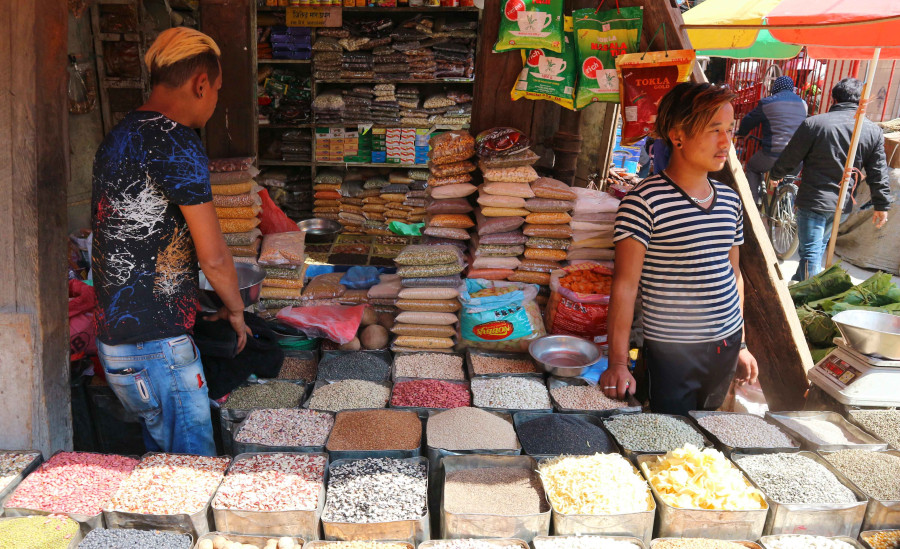Money
Rising freight rates push up food import costs
High living costs in cities like Kathmandu have forced people from low economic backgrounds to cut down on consumables, including water.
Krishana Prasain
Lower middle economies, including Nepal, may suffer higher food prices as dry bulk shipping charges have risen sharply, pushing up their food import costs. Experts have warned that if inflation isn’t tamed, it will bring social unrest.
Between February and May 2022, the Baltic Dry Index—a global benchmark for dry bulk freight rates—increased by 59 percent, according to The War in Ukraine and Its Effects on Maritime Trade Logistics, a report published by the United Nations Conference on Trade and Development (UNCTAD) recently.
This could lead to an additional increase of 3.7 percent in consumer food prices globally. Lower middle income countries will be hit the hardest.
The report said that among four economies—high income, upper middle income, lower middle income and low income—lower middle income countries may suffer an additional 4.2 percent increase in consumer food prices.
This increase is due to higher transport costs, resulting from higher freight rates and longer distances.
The report showed that a lower middle economy is dependent more on processed food products compared to primary food products. The share of processed food products imported in lower middle economies is 63 percent and primary food product import is 37 percent.
UNCTAD concludes that the high container freight costs observed from 2021-22 will be passed on and lead to an additional increase in consumer prices by 1.6 percent globally.
“Global import price levels will increase on average by 11.9 percent as a result of sustained freight rate increases,” the report said.
Disrupted regional logistics, the halting of port operations in Ukraine, the destruction of important infrastructure, trade restrictions, increased insurance costs and higher fuel prices have all contributed to the logistical hurdles arising in the Black Sea region.
They have also contributed to a more costly and unpredictable global trading and shipping environment.
Before the war, estimates projected growth of 3 percent in global sea exports of grain. Now, however, they are projected to shrink by 3.8 percent in 2022.
“Global shipments of fertiliser and its inputs such as potash are projected to drop by 7 percent in 2022,” the report said.
According to Nepal Rastra Bank, year-on-year consumer price inflation in Nepal jumped to a staggering 7.87 percent in May, hitting a 69-month high. It was 3.65 percent in May last year.
Food and beverage inflation stood at 7.13 percent in the first 10 months of the current fiscal year which was 4.72 percent in the same period last year.
Constantly rising inflation has played havoc with household budgets and caused anguish to the provider of the family, say experts.
The report said that middle income economies are more dependent on ships to import grains. The share of grains imported by dry bulk ships in total imports was 44 percent in lower middle income countries.
“The situation is critical,” said economist Bishwambhar Pyakurel. “If food prices increase, it will increase malnutrition in children. This will lead to instability in the country if the situation prolongs."
According to him, there are 7 million children between the ages of five and 17 years in Nepal, and a majority of them are already suffering from lack of balanced food access due to rising costs.
“There are no employment opportunities in the country. On the other hand, food prices are going up constantly,” Pyakurel said. “By the end of the current fiscal year, inflation may reach double digits, adding to the woes of the people.”
Experts say rising living costs in cities like Kathmandu have forced many people from low economic backgrounds to cut down on various consumable items, including water. At times, they have been forced to do so at the cost of their health, according to them.
Raj Kumar Nepali, 31, who lives in a squatter settlement at Sinamangal said he stopped buying bottled water after prices went up recently.
“Patients infected with cholera were found to have been drinking water directly from household taps as they could not afford to buy costly bottled water,” Balaram Tripathi, chief of the Health Department, told the Post in a recent interview.
“Despite knowing the risks, they are forced to drink tap water.”
With almost everything becoming dearer due to higher prices of petroleum products, the urban poor are struggling to manage their household budgets. Some have stopped boiling water to save on energy bills.
“It is believed that bottled water is comparatively safe, but people stopped using it due to rising costs,” Dr Sher Bahadur Pun, chief of the Clinical Research Unit at Shukraraj Hospital, told the Post recently.
“When we asked diarrhoea patients why they did not boil water before drinking it, most of them said it was too costly. Daily wage workers complain that they do not have time to boil water, hence they tend to drink whatever they get at their work sites.”
These are just some examples. Experts say that people in the low income bracket have been eating less because of rising inflation.
Prof Pushkar Bajracharya, former head of the Central Department of Management at Tribhuvan University, says a rise in food prices impacts the quality of life and prosperity in a family and society.
“Lower-income and poor people are largely affected by inflation,” he said. “When hunger increases, there are chances of social unrest.”
UNCTAD has made six recommendations regarding maritime transport challenges which include supporting developing countries, especially the most vulnerable economies such as small islands, developing and least developing countries and net food importers.
The report also suggested investing in transport services as well as trade and transit facilitation even more than in pre-war times.
“Trading partners and transit countries should focus on key determinants of international transport costs such as trade facilitation and digitalisation, infrastructure, economies of scale, imbalances and ensuring competition,” the report said.




 20.12°C Kathmandu
20.12°C Kathmandu













